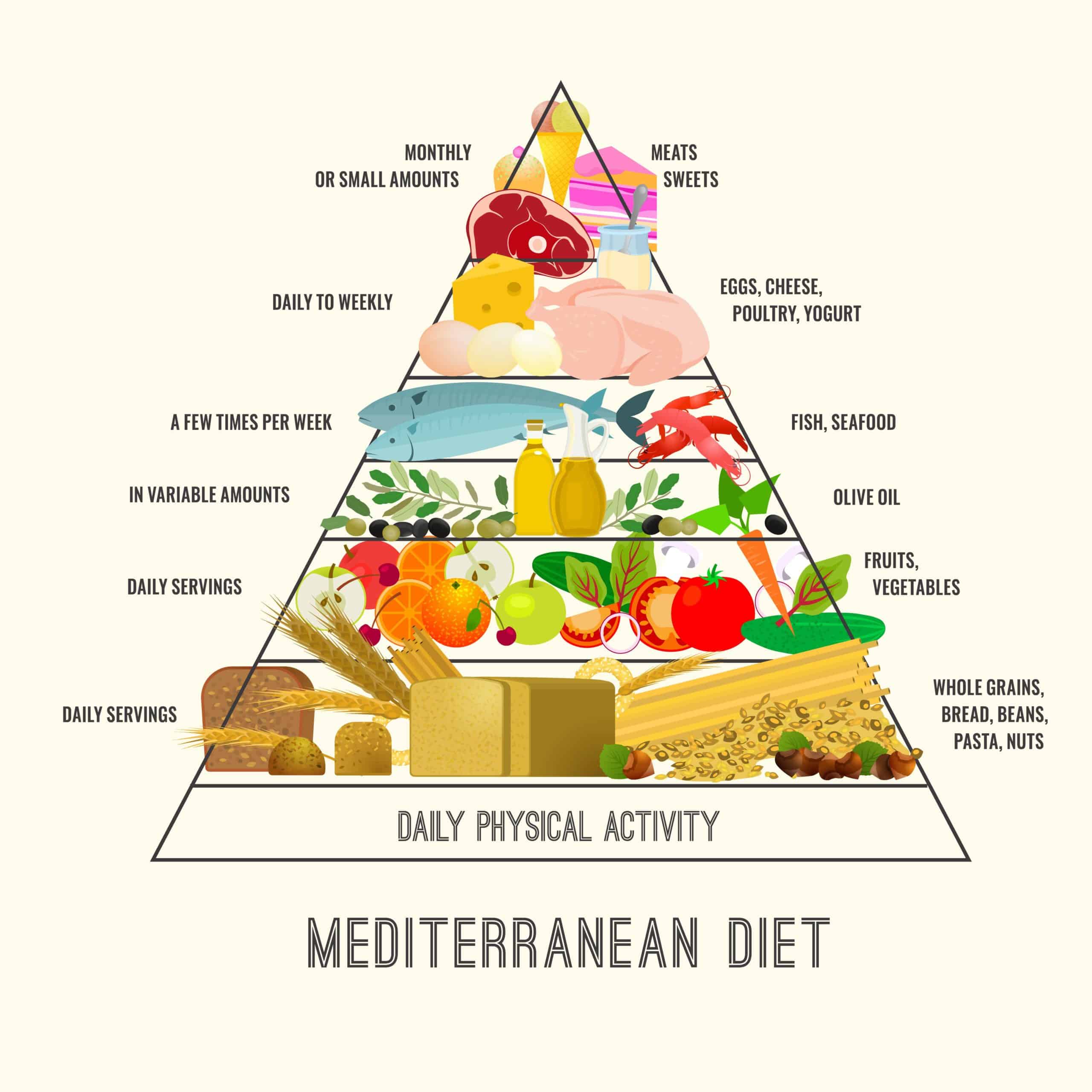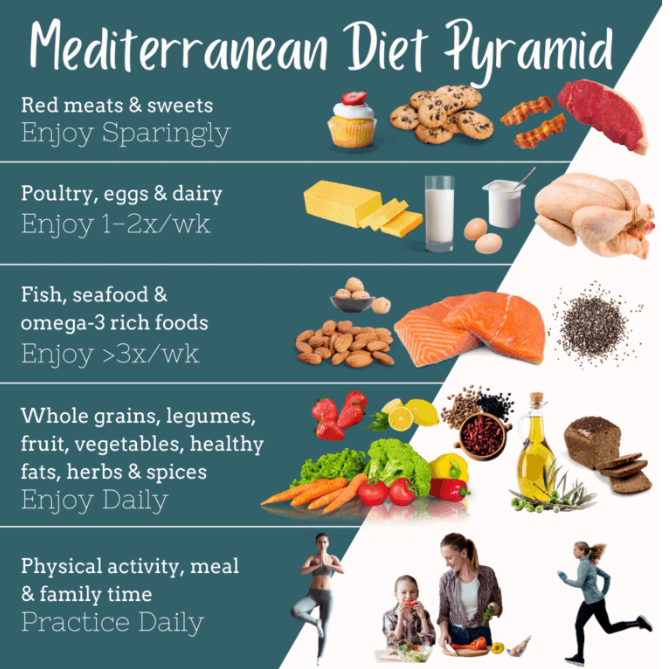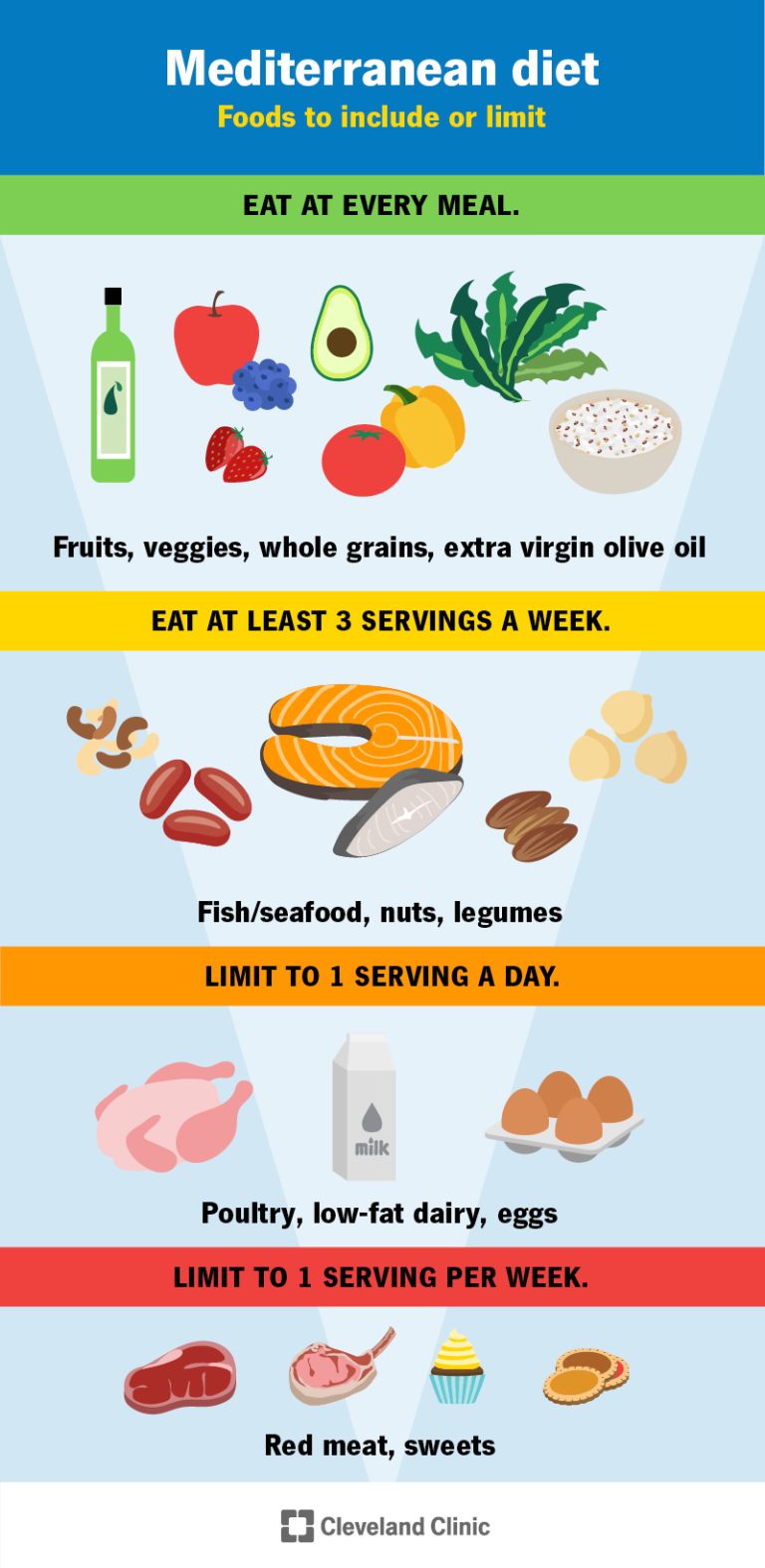The Mediterranean diet offers numerous health benefits, including improved heart health and reduced risk of chronic diseases. It emphasizes whole foods and healthy fats.
The Mediterranean diet, inspired by the traditional eating habits of countries bordering the Mediterranean Sea, focuses on whole grains, fruits, vegetables, nuts, and lean proteins. Olive oil, a staple in this diet, provides healthy monounsaturated fats beneficial for heart health.
Fish, rich in omega-3 fatty acids, is another key component. This diet also encourages moderate wine consumption and limited intake of red meat and processed foods. Research shows that adhering to a Mediterranean diet can lead to better weight management, lower inflammation, and a decreased risk of diseases such as diabetes, cancer, and Alzheimer’s. Its balanced and nutritious approach makes it a sustainable long-term eating plan.
Introduction To The Mediterranean Diet
The Mediterranean Diet is famous for its health benefits. It emphasizes fresh, whole foods. People who follow it often enjoy longer lives. This diet comes from countries near the Mediterranean Sea. It focuses on healthy fats, lean proteins, and lots of vegetables.
Origins And History
The Mediterranean Diet has ancient roots. It started in countries like Greece and Italy. People in these regions have eaten this way for centuries. Their diet was based on what they could grow and catch locally. This includes olives, fish, and fresh produce. Researchers noticed these people had lower rates of heart disease. This led to the diet becoming popular worldwide.
Core Principles
The Mediterranean Diet has several core principles. These principles guide what to eat. They also explain why this diet is healthy.
- Eat Plenty of Vegetables: Vegetables are a key part of every meal.
- Choose Whole Grains: Whole grains are healthier than refined grains.
- Healthy Fats: Use olive oil instead of butter or margarine.
- Lean Proteins: Eat fish and poultry more often than red meat.
- Limited Dairy: Choose low-fat options like yogurt and cheese.
- Fresh Fruit for Dessert: Skip sugary treats and eat fresh fruit.
A typical Mediterranean meal might include grilled fish, a fresh salad, and whole-grain bread. Olive oil is used for cooking and dressing. This diet also encourages staying active and eating with family and friends.
| Food Group | Examples |
|---|---|
| Vegetables | Tomatoes, spinach, broccoli |
| Whole Grains | Brown rice, quinoa, whole-wheat bread |
| Healthy Fats | Olive oil, nuts, avocados |
| Lean Proteins | Fish, chicken, legumes |
| Fresh Fruit | Apples, oranges, berries |
These core principles make the Mediterranean Diet balanced and nutritious. It is easy to follow and delicious. Many people find it enjoyable and satisfying.

Credit: www.everydayhealth.com
Nutritional Components
The Mediterranean diet is renowned for its health benefits. It emphasizes nutrient-rich foods that support overall well-being. This section will explore the key nutritional components of this diet.
Healthy Fats
Healthy fats are a cornerstone of the Mediterranean diet. These fats mainly come from olive oil and nuts. Olive oil is rich in monounsaturated fats, which help lower bad cholesterol. Nuts provide a good source of omega-3 fatty acids, promoting heart health.
- Olive Oil
- Almonds
- Walnuts
Lean Proteins
Lean proteins are essential for muscle growth and repair. The Mediterranean diet includes proteins from fish, poultry, and legumes. Fish like salmon are rich in omega-3 fatty acids. Legumes such as chickpeas offer a plant-based protein source.
- Salmon
- Chicken
- Chickpeas
Whole Grains
Whole grains provide essential nutrients and fiber. They support digestive health and help maintain energy levels. The Mediterranean diet favors whole grains like quinoa, brown rice, and whole wheat bread. These grains are less processed and retain more nutrients.
- Quinoa
- Brown Rice
- Whole Wheat Bread
Heart Health Benefits
The Mediterranean Diet is famous for its heart health benefits. This diet focuses on whole foods, healthy fats, and lean proteins. It helps in reducing the risk of heart disease and promotes overall cardiovascular health.
Reduced Cholesterol Levels
The Mediterranean Diet includes foods that lower cholesterol. Eating olive oil instead of butter reduces bad cholesterol levels. This oil contains monounsaturated fats, which are heart-friendly.
- Olive oil helps in lowering LDL cholesterol.
- Nuts like almonds and walnuts are rich in healthy fats.
- Fruits and vegetables are full of fiber, reducing bad cholesterol.
Including these foods in your diet can significantly improve your cholesterol levels.
Improved Blood Pressure
The Mediterranean Diet is also good for blood pressure. It emphasizes foods that help keep blood pressure in check.
| Food | Benefits |
|---|---|
| Leafy Greens | Rich in potassium, they help lower blood pressure. |
| Whole Grains | High in fiber, they aid in maintaining blood pressure. |
| Fish | Contains omega-3 fatty acids, which reduce blood pressure. |
These foods are essential for maintaining healthy blood pressure levels.

Credit: www.mygreekdish.com
Weight Management
The Mediterranean diet is more than just a way of eating. It offers numerous health benefits, especially for weight management. This diet emphasizes whole foods, lean proteins, and healthy fats. It encourages sustainable habits that make it easier to maintain a healthy weight.
Sustainable Weight Loss
The Mediterranean diet promotes sustainable weight loss. Unlike fad diets, it focuses on long-term health. This diet includes fresh fruits, vegetables, whole grains, and lean proteins. These foods are nutrient-dense and low in unhealthy fats. They help you feel full longer, reducing the urge to overeat.
- Eat plenty of fresh produce
- Include whole grains in your meals
- Opt for lean proteins like fish and poultry
- Use healthy fats like olive oil
These habits lead to gradual, sustainable weight loss. The diet also encourages regular physical activity. This combination helps you achieve and maintain a healthy weight.
Enhanced Metabolism
The Mediterranean diet can also enhance your metabolism. A higher metabolism helps burn calories more efficiently. The diet’s emphasis on healthy fats, like olive oil, supports metabolic health. These fats are rich in omega-3 fatty acids, which are essential for body functions.
| Healthy Fats | Metabolic Benefits |
|---|---|
| Olive Oil | Boosts metabolism |
| Fish | Rich in omega-3 fatty acids |
| Nuts and Seeds | Provides essential nutrients |
Protein is another key component. Lean proteins from fish and poultry help build muscle. More muscle mass means a higher resting metabolic rate.
- Eat lean proteins to build muscle
- Include healthy fats for metabolic health
- Maintain a balanced intake of all food groups
By focusing on these elements, the Mediterranean diet supports a healthy metabolism. This helps you manage your weight effectively.
Diabetes Prevention
The Mediterranean diet is famous for its numerous health benefits. One of its most significant advantages is diabetes prevention. This diet can help manage blood sugar levels and improve insulin sensitivity. These factors are crucial in preventing diabetes.
Blood Sugar Control
Blood sugar control is essential for preventing diabetes. The Mediterranean diet includes plenty of fruits, vegetables, and whole grains. These foods are rich in fiber. Fiber helps slow down the absorption of sugar in the bloodstream. As a result, blood sugar levels remain stable.
The diet also includes healthy fats from olive oil and nuts. These fats do not spike blood sugar levels. A balanced intake of carbohydrates, proteins, and fats helps maintain steady blood sugar.
| Food | Benefit |
|---|---|
| Fruits | Rich in fiber |
| Vegetables | Low in sugar |
| Whole grains | Slow sugar absorption |
| Olive oil | Healthy fat |
Insulin Sensitivity
Insulin sensitivity is vital for diabetes prevention. The Mediterranean diet improves insulin sensitivity. This means the body uses insulin more effectively. Insulin helps cells absorb sugar from the blood. Better insulin sensitivity reduces the risk of diabetes.
Foods rich in omega-3 fatty acids, like fish, improve insulin sensitivity. Antioxidant-rich foods, like berries, also help. These foods reduce inflammation and enhance the body’s response to insulin.
- Fish: Rich in omega-3 fatty acids
- Berries: High in antioxidants
- Leafy greens: Improve insulin function
Incorporating these foods into your diet can make a big difference. Small changes can lead to significant improvements in insulin sensitivity.
Mental Health Improvements
The Mediterranean Diet is famous for its physical health benefits. But, did you know it can also boost your mental health? This diet includes fruits, vegetables, nuts, and fish. These foods are rich in nutrients that support brain health.
Reduced Depression Risk
Studies show that the Mediterranean Diet can reduce depression risk. This diet is high in omega-3 fatty acids from fish and nuts. Omega-3s are essential for brain health. They help reduce inflammation and support brain function.
Researchers have found that people who eat this diet have lower depression rates. The diet’s high levels of antioxidants from fruits and vegetables also play a role. Antioxidants protect brain cells from damage.
Cognitive Function
The Mediterranean Diet also supports cognitive function. Foods like leafy greens and berries are rich in vitamins and minerals. These nutrients help improve memory and thinking skills.
A study showed that older adults who follow this diet have better cognitive performance. They perform better on memory tests and other brain function tests. The diet’s healthy fats, like olive oil, also support brain health.
Here is a quick overview of the nutrients that benefit cognitive function:
| Nutrient | Source | Benefit |
|---|---|---|
| Omega-3 Fatty Acids | Fish, Nuts | Reduce Inflammation |
| Antioxidants | Fruits, Vegetables | Protect Brain Cells |
| Vitamins | Leafy Greens, Berries | Improve Memory |
In summary, the Mediterranean Diet is excellent for mental health. It reduces the risk of depression and boosts cognitive function.
Longevity And Aging
The Mediterranean diet is known for its health benefits. It promotes a longer and healthier life. This diet includes fruits, vegetables, whole grains, and healthy fats. Studies show that it can improve longevity and slow aging.
Increased Lifespan
Eating a Mediterranean diet can lead to a longer life. People living in Mediterranean regions often live longer. This diet includes foods rich in nutrients and antioxidants. These nutrients help protect the body from diseases.
Research shows a reduced risk of heart disease and cancer. These are the two leading causes of death. A table below illustrates some key components of the diet and their benefits:
| Food | Benefit |
|---|---|
| Olive Oil | Rich in healthy fats |
| Fruits | High in vitamins and antioxidants |
| Vegetables | Rich in fiber and nutrients |
| Whole Grains | High in fiber |
| Fish | Rich in omega-3 fatty acids |
Anti-inflammatory Effects
The Mediterranean diet has anti-inflammatory properties. Inflammation can cause many health problems. It can lead to heart disease, arthritis, and even cancer.
This diet includes foods that reduce inflammation. These foods are rich in antioxidants and healthy fats. Olive oil, nuts, and fatty fish are good examples. They help lower inflammation and improve overall health.
Below is a list of anti-inflammatory foods in the Mediterranean diet:
- Olive oil
- Nuts and seeds
- Fatty fish like salmon
- Fresh fruits and vegetables
Adopting the Mediterranean diet can lead to a longer, healthier life. It reduces the risk of many diseases and keeps the body young and strong.
Easy Adoption Tips
The Mediterranean diet offers numerous health benefits. It boosts heart health, aids weight loss, and promotes longevity. Adopting this diet is easy with a few simple tips. Below, you’ll find practical advice to help you get started.
Simple Meal Ideas
Creating delicious Mediterranean meals is easy. Here are some ideas to get you started:
- Breakfast: Greek yogurt with honey, nuts, and fresh berries.
- Lunch: Quinoa salad with tomatoes, cucumbers, olives, and feta cheese.
- Dinner: Grilled salmon with lemon, olive oil, and steamed vegetables.
- Snacks: Hummus with carrot sticks, or a handful of almonds.
Shopping List Essentials
Stock your pantry with these Mediterranean staples:
- Olive Oil: Use for cooking and dressings.
- Fresh Vegetables: Tomatoes, cucumbers, spinach, and bell peppers.
- Fruits: Berries, apples, and citrus fruits.
- Whole Grains: Quinoa, brown rice, and whole wheat bread.
- Lean Proteins: Fish, chicken, and legumes.
- Dairy: Greek yogurt and feta cheese.
- Nuts and Seeds: Almonds, walnuts, and sunflower seeds.
| Category | Items |
|---|---|
| Healthy Fats | Olive oil, avocados |
| Vegetables | Tomatoes, spinach, bell peppers |
| Fruits | Berries, apples, citrus fruits |
| Whole Grains | Quinoa, brown rice, whole wheat bread |
| Proteins | Fish, chicken, legumes |
| Dairy | Greek yogurt, feta cheese |
| Nuts and Seeds | Almonds, walnuts, sunflower seeds |

Credit: blog.uchceu.es
Frequently Asked Questions
What Happens To Your Body When You Start The Mediterranean Diet?
The Mediterranean diet improves heart health, aids weight loss, boosts brain function, and reduces inflammation. You’ll feel more energetic and may see better digestion.
What Are The Top 10 Foods On A Mediterranean Diet?
The top 10 foods on a Mediterranean diet include olive oil, fish, nuts, seeds, fruits, vegetables, whole grains, legumes, yogurt, and herbs.
Why Is The Mediterranean Diet So Successful?
The Mediterranean diet is successful due to its focus on whole foods, healthy fats, and balanced nutrition. It promotes heart health and longevity. This diet includes fruits, vegetables, nuts, and lean proteins, making it both nutritious and sustainable. Its flexibility and delicious flavors also contribute to its popularity.
How Long Does It Take To See The Benefits Of A Mediterranean Diet?
You might start noticing benefits of a Mediterranean diet within a few weeks. Improvements in heart health and energy levels are common. Significant changes, like weight loss or reduced inflammation, may take a few months. Consistency is key for long-term benefits.
Conclusion
Embracing the Mediterranean diet can boost your overall health and well-being. Its focus on whole foods, healthy fats, and lean proteins promotes heart health. Enjoying a variety of fresh fruits and vegetables supports a balanced diet. Make the switch today for a healthier, happier lifestyle.


